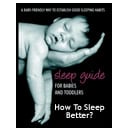
How To Sleep Better?
 Presented by Robert Winston, How to Sleep Better is a practical guide to the world of sleep. The programme explores the common problems, dangers and the mysteries that have puzzled scientists for years.
Presented by Robert Winston, How to Sleep Better is a practical guide to the world of sleep. The programme explores the common problems, dangers and the mysteries that have puzzled scientists for years.
One in five motorway accidents are attributed to a lack of sleep, which was also a contributory factor in disasters such as Chernobyl and the Challenger shuttle explosion.
This programme looks at the dangers of poor sleep, how people perceive their sleep and provides real solutions.
Viewers can find out about practical tools to help them get a good night's sleep rather than resorting to over the counter drugs. Most people have suffered the torment of a sleepless night at some point in their lives - for some it's an ongoing misery. How to Sleep Better follows a group of self-professed poor sleepers as they take part in a 'sleep lab' to pinpoint what is keeping them awake.
By pressing the red button as these tests happen on air, viewers can get their own sleep profile by taking part in an interactive questionnaire. The profile has tips on what areas to look at, and as the programme continues, provides advice tailored to your specific sleep profile.




the documentary observed here seams to me the had some positive results by their profile
I thought this documentary to be real successful in a lot of ways
The show is too long, it took 1h30 to finish it and results are not really surprising.
Check out Six Steps To Sleep Now. You will be sleeping better in 3 days if you don't deviate from the program. Guaranteed
Wish i could finish watching this but i can't seem to stay awake.
Didn't find in quite informative, you can read an article or two in 10 minutes yet get the same knowledge as this show, whereas this took 1,5 hour from my life. it says really simple things such as snoring, organising the room, reduce stress, drink a lot of water etc.
Before and After Multiple choice tests are ridiculously inaccurate.
Well, as a person with extreme sleep disorders, this doc was useless for me (and I'm only a half hour in). After a sleep study that was mostly inconclusive, they said I suffer from insomnia and Delayed Sleep Phase Syndrome, and god only knows what else.
I wake up between 8pm-2am. IF I go to sleep at all (and I can stay awake 36 hours or more), it'll be between 6am-10am. Once I finally fall asleep, I can sleep for 24 hours or more, if I let myself. Most times I get 12-18 hours.
My circadian rhythm is actually backwards. The questions they asked their volunteers didn't even have options that applied to someone like me. It's 3:30am now, and I just woke up at 1:30am. Clearly I'm a night owl, but I can sleep like Rip Van Winkle. I'm lucky I'm not working right now, or I'd get no sleep at all, and I'd require one of those lights when I get up. They cost $50 a month to rent.
Obviously they still have a lot to learn in the area of sleep disorders. It would be nice if there was a cure for me, so I could sleep and live like a normal person.
To bad the quality is gigantic poor. Otherwise would have loved to watch.
I should be asleep right now instead of watching this video!
nvm, it just appeared after a long load
The video is not appearing for me, has it been taken down or something?
Very Interesting. Worth watching if you've ever had trouble sleeping.
That snoring woman should be in the Guiness book of world record! I am surprised how the husband tolerated her snoring for 9 years...LOL
Hum. Well, it's 10 after nine P.M. now: Tip #1 Don't start a long documentary at 9:10 when you have to get up early tomorrow morning for work!
Yes, yes, good adice, Charles. Save this one for tomorrow. ;-)
Lots of final results not enough tips. So while you may not learn how to sleep better by watching this program, you do learn how getting enough sleep improves your day.